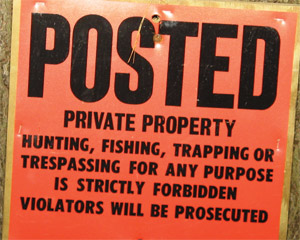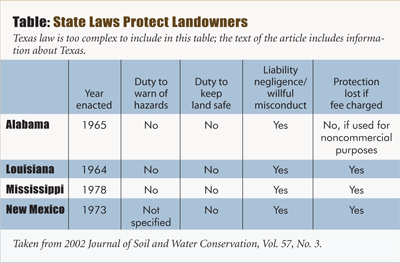
As a landowner, you face liability risk from all sides.
- You must comply with state and federal regulations on water, air and ground pollution, along with laws protecting endangered species.
- If you hire workers, your liability extends to their injuries or deaths and to unfair labor practices.
- You risk prosecution for harming historic sites such as cemeteries.
- Moreover, special rules apply to equestrian and pick-your-own operations.
But research shows that landowners are most concerned about liability relating to trespassers and hunters on their property.
Before you build a giant wall around your place, take heart — you may be more protected than you realize: In recent decades, all 50 states have enacted laws limiting landowner liability. Plus, you can take steps to help protect yourself.
Liability Depends on Classification
Judon Fambrough is an attorney and senior lecturer at the Real Estate Center of Texas A&M University. "According to case law, a landowner’s liability, or responsibility, for anyone entering the property depends on the legal classification of the person at the time of the injury," he says. While state laws differ, most rely on these classifications:
- Invitees, including fee-paying hunters. You must protect them by keeping your property safe and warning them of dangerous conditions that a reasonable inspection would reveal.
- Licensees, including nonpaying hunters with permission. You have a duty to warn them of known dangerous conditions or make the place safe, but no inspection is required.
- Trespassers, including hunters not given permission. You owe trespassers little legal duty.
- Trespassing children unaccompanied by an adult. You have greater responsibility to children under the Attractive Nuisance Doctrine.
Trespassers Have Fewer Rights
As Fambrough explains, landowners owe the highest degree of care to invitees. "Invitees, under Texas case law, are viewed as economic guests if they pay a fee to enter," he says. "This includes hunters and nature tourists paying for the privilege to enter the property."
You owe much less to a trespasser, he adds. "Basically, the landowner must refrain from injuring the trespasser intentionally, maliciously or through gross negligence. This rule applies to all people, whether or not they are citizens of the U.S." Generally, warning trespassers of a condition that can cause serious bodily harm relieves you of liability.
Avoid an Armed Confrontation
"The law prohibits the landowner from willfully or wantonly injuring a trespasser except in self-defense or when protecting property," Fambrough stated in his report, "The Texas Deer License," revised in 2007. Trespassing counts as a misdemeanor. In Texas, a trespasser carrying a firearm faces higher fines and longer possible jail time.
Gee Ogletree, a Jackson, Miss.–based attorney with Adams and Reese LLP, specializes in real estate and forestry law and has conducted workshops on liability in Alabama, Louisiana, Mississippi and Texas. He strongly advises against facing trespassers with a firearm.
"You have a right to defend yourself and your property using appropriate force commensurate with the threat, but I never advise people to perform a citizen’s arrest," he says. "You don’t want to hold people at gunpoint. If they’re hunters, they probably have guns themselves. It’s best to calmly ask people to unload their weapons and leave, report it to the authorities, and then prosecute."
Use Common Sense to Protect Property
As Ogletree says, it all boils down to responsible behavior and common sense. You can’t stretch a cable to stop someone who drives a boat across your stream, for example, and you should not allow pesticide or herbicide sprayers to mix chemicals or dump empty containers on your property.
Ogletree and Fambrough agree that firefighters and emergency medical services personnel performing official duties are not considered trespassers. The same typically applies to government and utility workers.
Attractive Nuisance Laws protect trespassing children in many states. An attractive nuisance exists when the child is too young to appreciate a dangerous condition, or if you knew about a dangerous condition that children may frequent. You must also balance the cost of eliminating the condition against the probability of injury.
The Standard for Recreational Guests
According to Fambrough, Texas sets the standard for protecting landowners from liability related to hunters. Under Chapter 75 of the Texas Civil Practices and Remedies Code, the degree of care owed an invitee on agricultural land for recreation is no greater than the duty owed a trespasser.

However, when landowners charge these guests a high entry fee, the statute limits the amount that can be charged and still retain liability protection, unless landowners purchase minimum amounts of liability insurance.
"Basically, protection is lost whenever landowners charge all recreational guests, on an annual basis, a total of more than 20 times the amount of property taxes levied on the premises last year," Fambrough says. "If they exceed this limit, then the landowners owe the recreational guests who pay to enter the same duty owed an invitee, not the duty owed a trespasser. However, if the landowners have the statutory required minimum amounts of insurance, then they preserve the protection. This insurance policy limits the landowner’s liability to the face value of the policy, regardless of whether the landowner charges an entry fee." Required minimum insurance amounts are:
- $500,000 for each person,
- $1 million for each single occurrence for bodily injury or death
- $100,000 for each single occurrence for property damaged or destroyed.
Fambrough provides an example. "Suppose the property tax levied on the premises used for recreational purposes in 2006 was $5,000," he says. "The landowner would not necessarily need the insurance unless he or she charges all recreational guests in 2007 in excess of $100,000. However, landowners may want to purchase the insurance, even though they charge less, to cap liability in the event of a lawsuit."
Waiver-of-Liability Agreements
In addition, as a landowner, you may want to obtain a waiver-of-liability agreement from each hunter and recreational guest before they enter the property to forestall potential lawsuits. The waiver can protect you from negligent conduct and/or conditions, but it won’t protect you from conduct or conditions that are caused intentionally, maliciously or through gross negligence, Fambrough says.
For more information on rules that apply to submerged property and for poaching, discharging firearms across property lines and hunting near cities, see Fambrough’s "The Texas Deer Lease," listed below, under "For More Information."
State Law Protection
Now you know how to protect yourself from liability when it comes to trespassers and hunters. But if you are sued for liability, will your state’s laws protect you?
In 1965, the Council of State Governments drafted model recreation-use legislation. Since then, according to a 2002 article in the Journal of Soil and Water Conservation, all 50 states have adopted laws protecting landowners from liability.
Ronald A. Kaiser, a professor at Texas A&M University, co-authored the article, titled "Rural Landowner Liability for Recreational Injuries." "The myth and perception of landowner liability appears to be greater than the actual liability risks," the article stated. "State recreation-use statutes provide significant liability protection for landowners."
The article tallied success rates of recreational injury lawsuits against landowners in appellate courts. In the Tenth Farm Credit District’s five states, Louisiana stands out — only New York reports more successful litigation against private landowners. Most cases in Alabama and Louisiana related to swimming, reflecting a national trend in landowner liability. Hunting provides little exposure for landowners, the article states — nationally, only 15 cases involved hunting accidents, and seven of those occurred in Louisiana.
How Does Your State Rank?
The article broke down landowner liability law by state. Of the five states in the Tenth District, only Alabama and Texas protect landowners who charge fees. Still, Alabama was one of 10 states accounting for a large share of private landowner litigation. The article indicated that Texas protections seem to be working — Texas reported only two cases against private landowners.
But Fambrough warns of a possible threat. In 2006, a girl drowned while tubing on the Blanco River in central Texas. She was sucked into a culvert hidden by high water. Earlier, several people nearly drowned at the same location. The state gave no warning, and the parents sued the state for wrongful death, alleging gross negligence for failing to warn. Even though Chapter 75 covers the state as well as private landowners, the Texas Supreme Court allowed the case to go to trial.

"It remains to be seen what impact this decision will have on closing gates to fee-paying hunters and recreational guests," Fambrough says. In the meantime, he suggests that you widen language in your waiver to include "Contractual Assumption of the Risk."
While few cases against landowners succeed, you may not want to take any chances. "State statutes put fee-paying guests on the same level as trespassers, but they don’t protect you from everything," Ogletree says, pointing especially to laws relating to children. "The degree of protection varies from state to state, and counsel should advise landowners as to whether their state law adequately protects them and what steps they need to take. No law provides absolute immunity."
Ogletree offers his bottom line: "I don’t let anyone come on my property with-out a written agreement. Not even neighbors or Boy Scouts, and I was an Eagle Scout. You’ve got to be a businessperson," he says.
Editor’s note: This article is for information only; it is not a substitute for legal counsel.